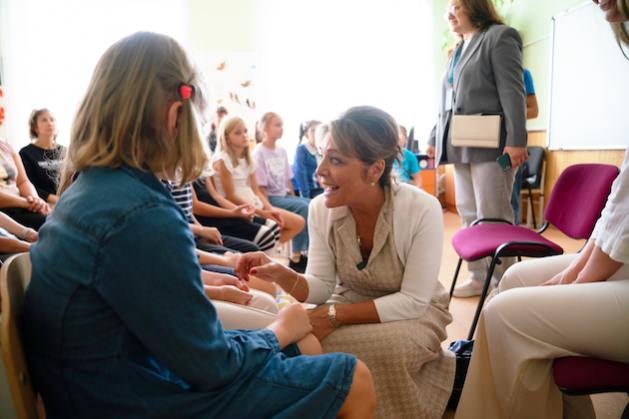
UNITED NATIONS, Sep 17 (IPS) – Education Cannot Wait (ECW) has delivered quality education to children in crisis “against all odds”, ECW Executive Director Yasmine Sherif said at the United Nations today. “And you can imagine the opportunities. We are seeing more armed conflict, an increase in climate-related disasters and the largest refugee movement since World War II.”
Education can’t wait’s ‘Results against all expectations: Annual results report 2023‘, launched today (17 September 2024), details the urgent need for additional funding. The number of children in urgent need of education support has almost tripled since 2016, but for the first time in a decade, funding for education in emergencies and protracted crises has fallen.
The global community is falling short of its commitment to provide for ‘quality education for everyone‘By 2030, the report says, armed conflict, forced displacement, climate change and other emergencies and protracted crises will have left more than 224 million crisis-affected children in urgent need of education support, up from 75 million in 2016.
According to the report, total humanitarian funding for education fell by 3% last year, from $1.2 billion in 2022 to $1.17 billion in 2023.
Despite this, education cannot wait (ECW), the United Nations Global Fund for Education in Emergencies and Protracted Crises, and its strategic partners continue to make life-saving, life-sustaining, multi-year investments in education for the world’s most vulnerable children and adolescents.
Sherif thanked ECW’s partners and the global community that supports education for children in crisis.
“Mostbyall,Weto haveUnpleasantthanksthechildrenWHOAreclingingonUnpleasantheapDespitethedarknessAndthechancesin return forthem,stillwantUnpleasantto goUnpleasantschool,wantUnpleasantto learnAndwantUnpleasantchangetheirlives.Now,DespiteallthisalarmingtrendsAndrealities,educationcan’twait,” Sherif said, noting that this report gave details of many children who was reached sinceECWbecameoperationalin2017.
“That issixyears,11millionofAholisticqualityeducation,AneducationThatischild-centeredAndThatentitles you tothewholespectrumbyschoolresourcesacademiccourse,artAndmentallyhealthAndpsychosocialservices,protection,lecturercourseAndlecturersupport,underSoa lot ofotherthings.” In 2023 alone, 5.6 million girls and boys were reached, she noted.
More funding needed to achieve 2026 target
To date, the fund has raised more than $1.6 billion from public and private donors. However, US$600 million in donor contributions is urgently needed for ECW and its strategic partners to reach a total of 20 million children and adolescents with inclusive, quality education by the end of the 2023-2026 strategic plan period.
“For our 25 strategic donor partners, these transformative investments deliver high-quality, child-centered, holistic education, and represent a commitment to sustainable development, human rights, economic resilience, and global security,” said Gordon Brown, UN Special Envoy for Global Education and Chair of ECW’s High-Level Steering Group.
“Education is the most powerful tool to restore hope in a world scarred by brutal conflict, human rights violations and inequality. It is our investment in a new generation of leaders.”
From Afghanistan, the Democratic Republic of Congo, Ethiopia, Gaza, the West Bank to Haiti, the Sahel, Sudan, Ukraine and other flashpoints around the world, ECW’s report highlights the profound impact of education in crisis situations.
Financing education: a moral choice
“Girls and boys in crisis are bearing the brunt of brutal man-made conflict, forced displacement, climate change and other disasters. Our new report proves that despite these challenges, it is possible to provide them with the protection, hope and life-changing opportunity of a quality, holistic education. To do this, we urgently call for US$600 million to meet our strategic plan goals and secure a better future for 20 million girls and boys by the end of 2026,” said ECW Executive Director Yasmine Sherif. “Now is the time to make a moral choice aligned with political action.”
The new report shows that ECW is strongly targeting the world’s most vulnerable and at-risk children: of the children reached in 2023, more than half were girls (51%), 17% were internally displaced and 22% were refugees.
The quality and impact of education provided, even in the most challenging circumstances, is also improving. Overall, 9 out of 10 programs reported improved school enrollment and 72% showed gender-equitable progress. ECW reported that of the programs that can monitor learning outcomes, 80% of investments showed academic improvements and 72% showed improvements in children’s social and emotional learning and well-being.
ECW investments also improved continuity of education. There was a clear increase in the number of boys and girls reached through the Fund’s investments in early childhood and secondary education, disability inclusion, gender transformative approaches, mental health support, and flexible, holistic solutions that address the needs of the whole child.
The climate crisis is an education crisis. The share of children reached by First Emergency Responses due to climate-related hazards has almost doubled from 14% in 2022 to 27% in 2023.
The report outlines ECW’s unique approach and describes the results it delivers: improved coordination at the intersection of humanitarian and development, joint programming, increased localization and community engagement, and building stronger data and evidence systems.
It showcases ECW’s efforts with partners to implement key United Nations initiatives and reforms, including the Grand Bargain Agreement, the 2030 Agenda for Sustainable Development, and UN Secretary-General reform. The report shows that systems are in place and that Education Cannot Wait has brought a revival through bold support to make systems work optimally. But funding is needed to achieve the goals.
“Education is a public good and a fundamental right. To achieve our goals, world leaders must align policy, funding and humanitarian principles. Multilateral aid funding must be increased immediately to reverse the current downward trend, and partnerships and collaboration must be strengthened in humanitarian, development and peace efforts. Education Cannot Wait has shown us that the seemingly ‘impossible’ is indeed possible, if the funding is made available,” Brown said.
IPS UN Office Report
Follow @IPSNewsUNBureau
Follow IPS News UN Bureau on Instagram
© Inter Press Service (2024) — All rights reservedOriginal source: Inter Press Service







